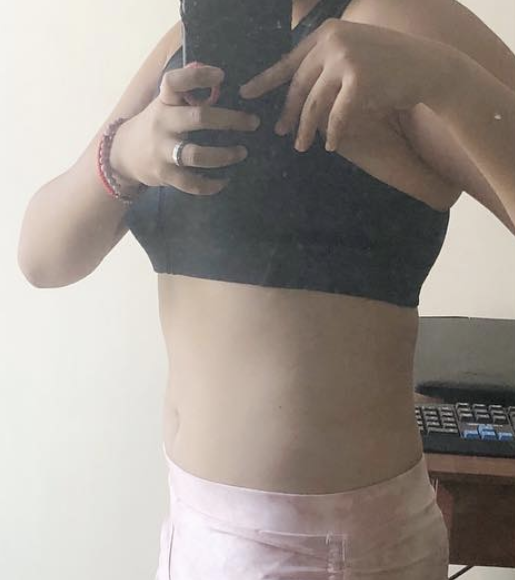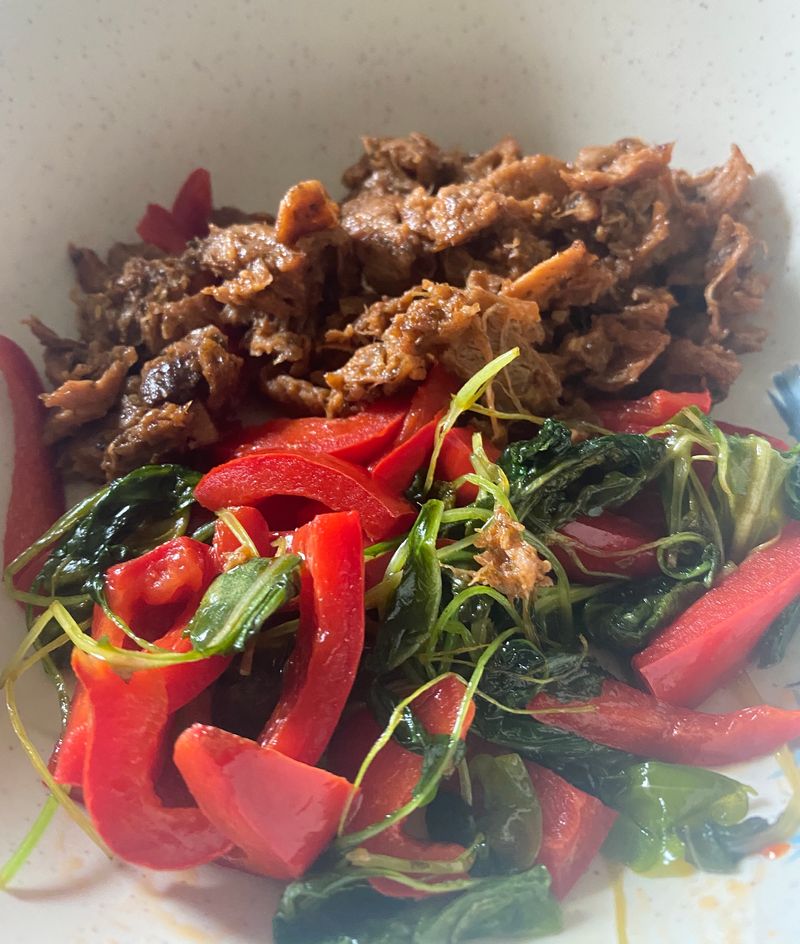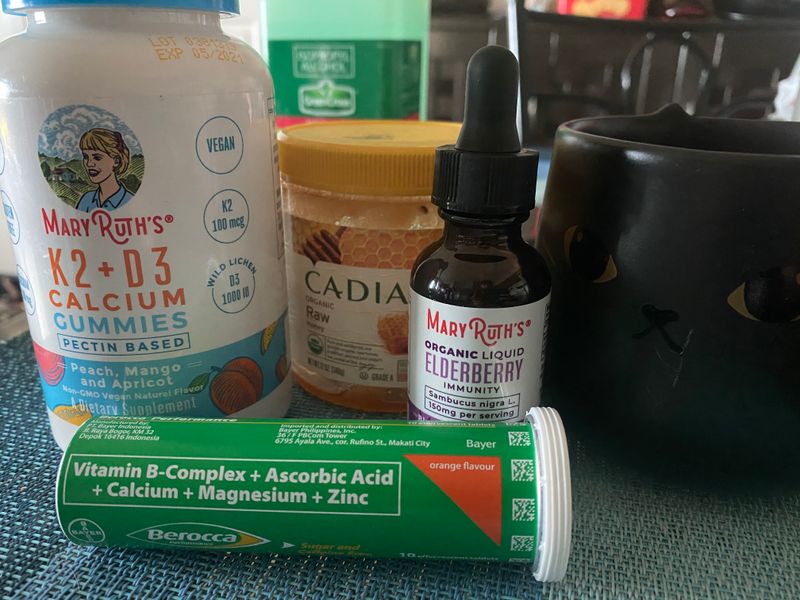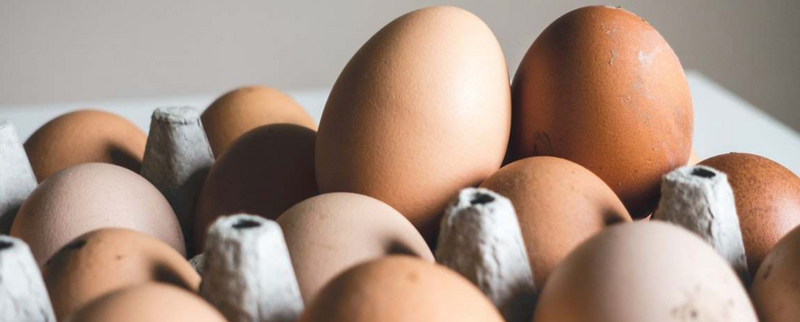So this is me in early June vs September of 2018. I didn't take any dieting pills, instead, I observed my body, made some new healthy habits and added more exercises. Want to know more about how I did it? See my tips below:
A word of caution: Before you start trying any of these things that worked for me, make sure you don't have thyroid problems nor diabetes. These two conditions mess with your hormones and may have some impairment on the function of your organs.
Hypothyroidism is largely caused by inflammation. Even when your family has no history of this illness, you can develop it by bad eating for your body type. However, if you take hormonal treatment, most of my tips (except IF) will help you remove it in the long run.
Always consult with your GP first before trying out diet changes, etc.
Eliminate Intolerances
I have always been bloated all my life. The only time I wouldn’t bloat was the few hours before I ate anything. After that, it’s pretty much downhill. I attributed my “fat belly” to being bloated and nothing more, that’s why maybe I made bad food choices most of the time.
So I tried the LOW FODMAP diet, which consists of avoiding foods that cause some chemical release in your body. It was very difficult and I had very unsatisfactory results, so I had to stop and try something else. I never stopped researching until I found a lady who mentioned she got some blood work done and found out her intolerances. This way is expensive though, but I thought it was worth the shot because the dieting and food restriction wasn’t helping that much.
The test cost me about 9k with almost 200 food groups checked. When the results came, I was aghast because the things that were causing me inflammation (intolerances) were almost everything that I loved to eat. Figure it out! I had to cry my eyes out for a while. I had to remove corn, pistachios, nuts, pretty much all the beans and even had to avoid egg! The only saving grace was that I wasn’t intolerant to a bunch of vegetables so I wasn’t really worried about it. But corn! man that was tough! Even some pancake syrups have high fructose corn syrup! That was how tough it was! even the derivatives, I had to be cautious with.
Intolerances are like minor allergies. People with allergic reaction don’t really have trouble removing the food that causes them harm because the resulting experience is more difficult for them. For intolerances, they are difficult to spot. Sometimes they come as headaches, blurred vision, fatigue, bloating and irritability. They aren’t very obvious, but the invisible thing is, they are causing inflammation to your body which is releasing a bad chemical combination that is toxic within your blood stream. It’s like killing you very very slowly each time you eat.
So I started with food elimination. Because there was a lot to eliminate, I had to find ways to sustain “eating” by adding more foods that were good for me. Here comes the next item.
Eat more of the foods that are good for your blood type.
So when I had to cut off corn, I had to find some other food to add in that was beneficial for me. Seaweeds and mushrooms were good alternatives, not really a replacement though. Just try to find foods that you also love (but don’t really get to eat often) so that when you give up the one favorite food that you’re intolerant to, it doesn’t hurt that much, plus you give more love to your body.
Here comes the research for “Eating right for your blood type”. I bought a copy of that book for 3 different blood types. First, I had lived some years thinking I was AB (because my mom said so—and I haven’t seen my blood work results myself). So, I was eating wrong. I went to have blood work done for blood typing and found I was O+. Imagine the shock :D
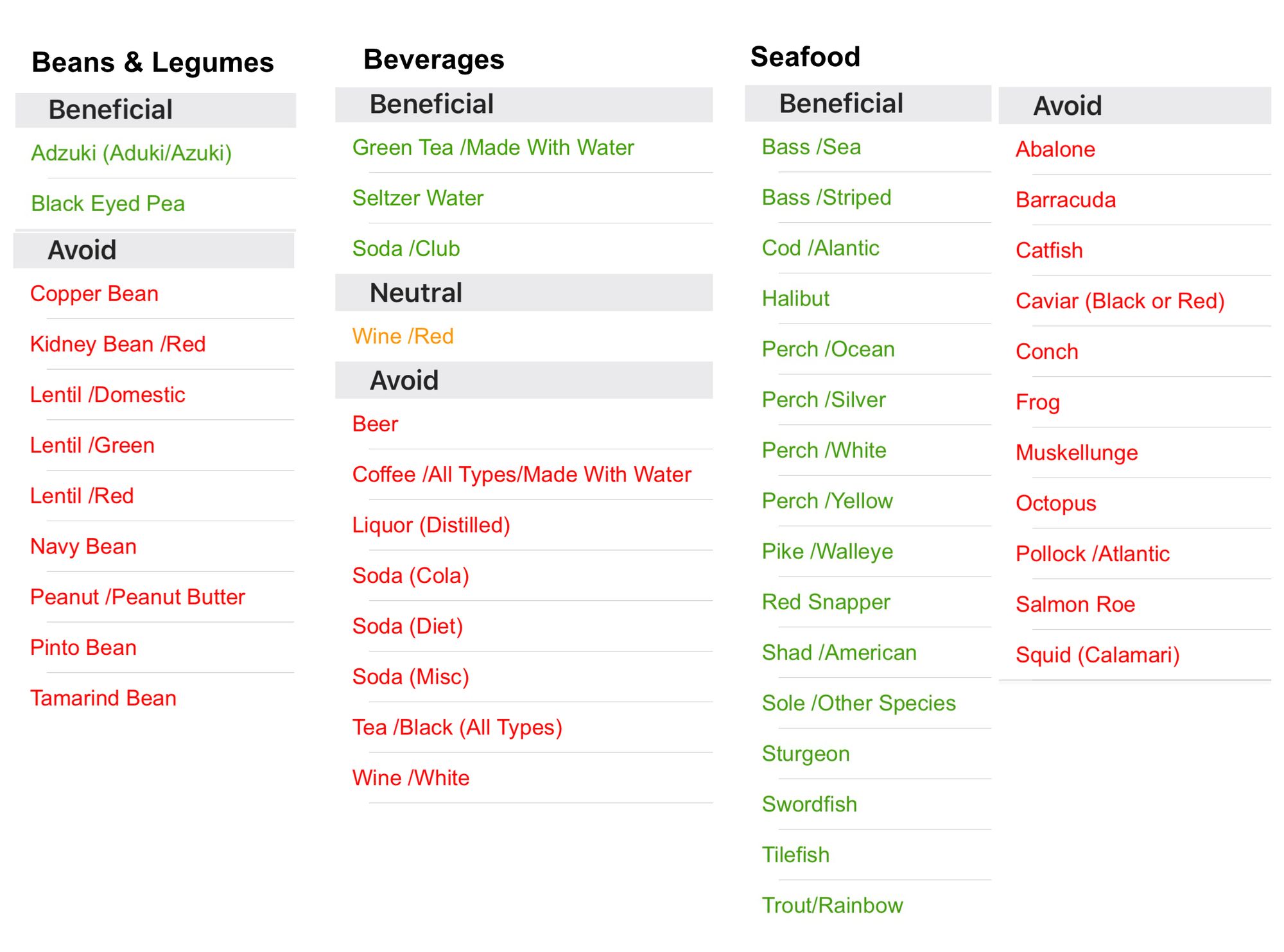
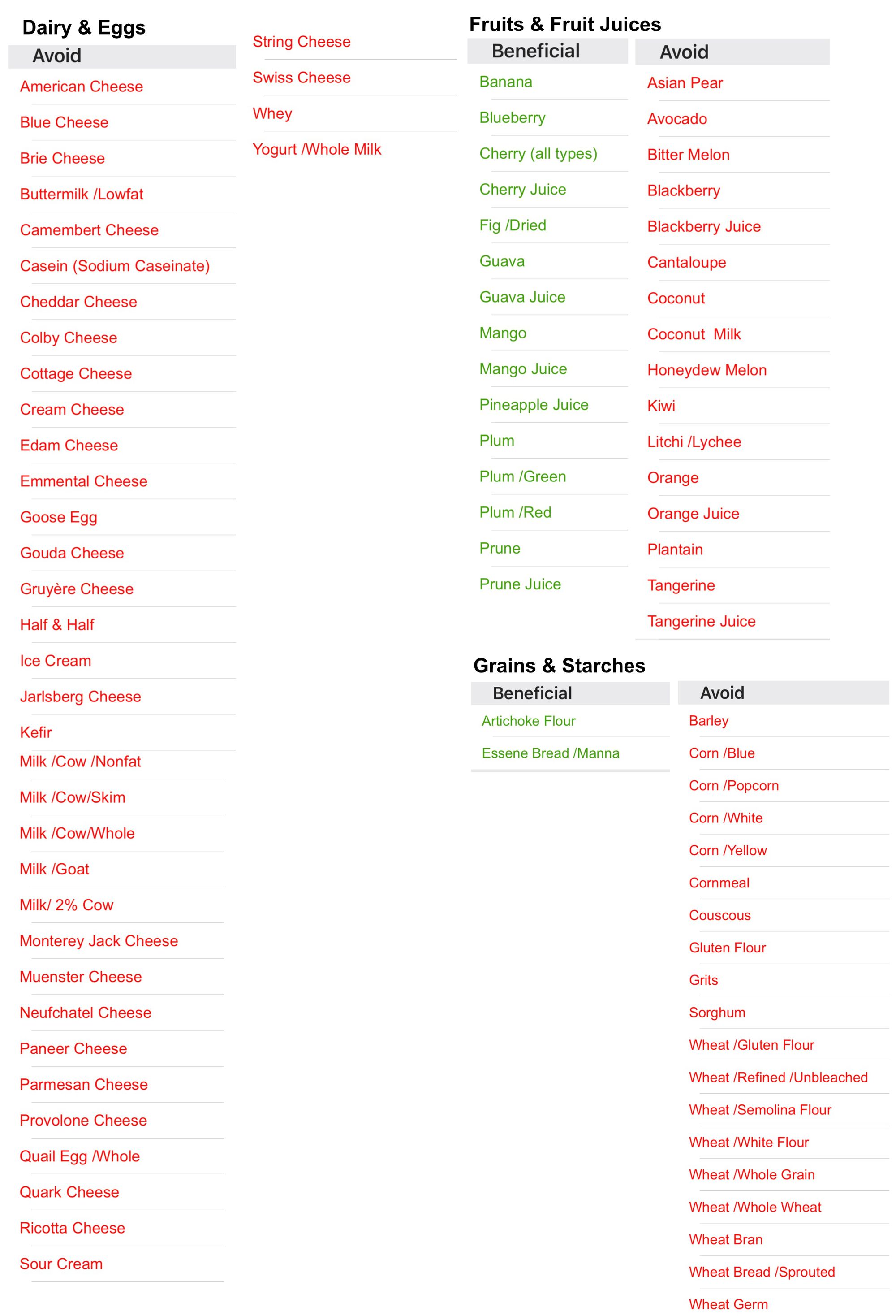
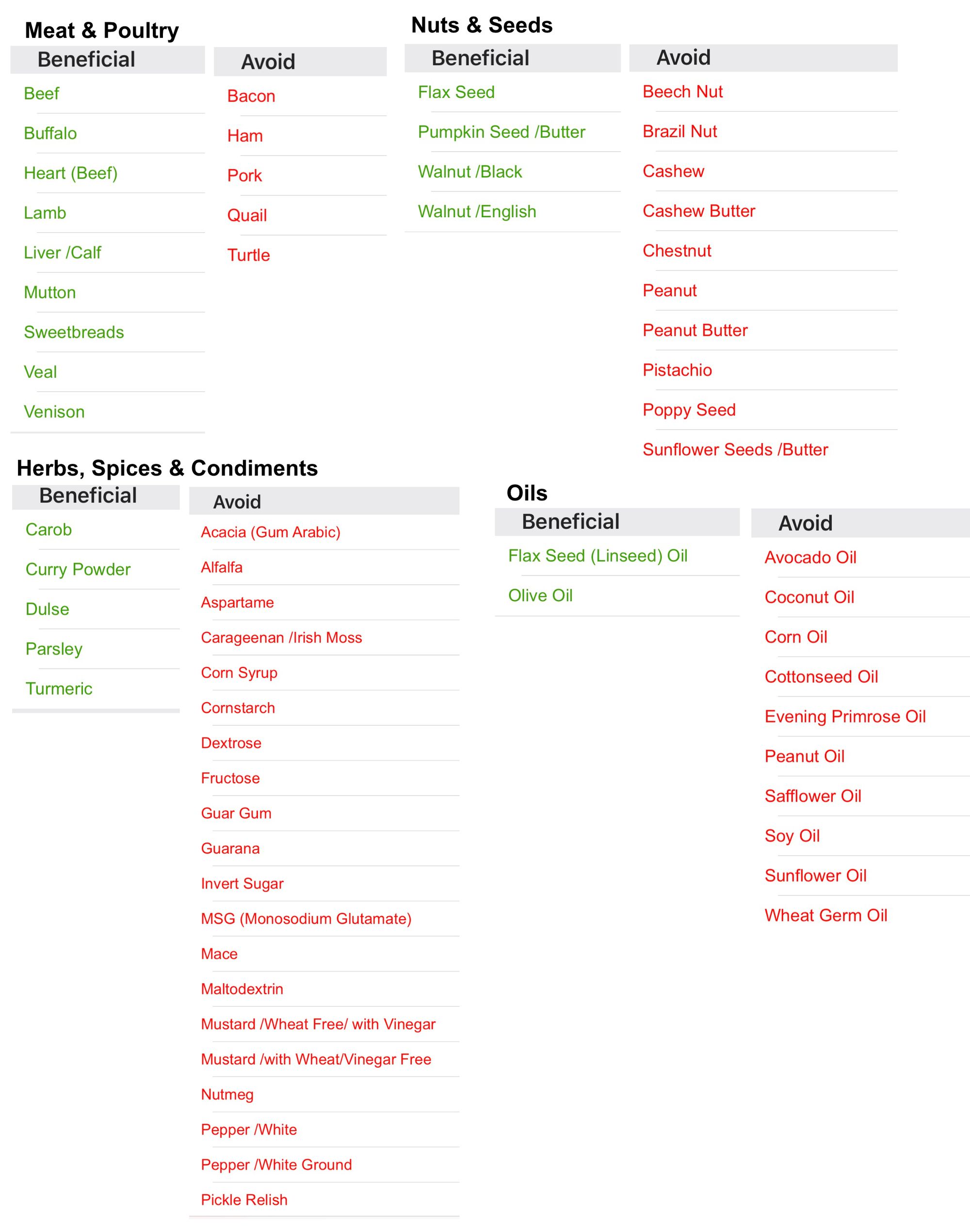
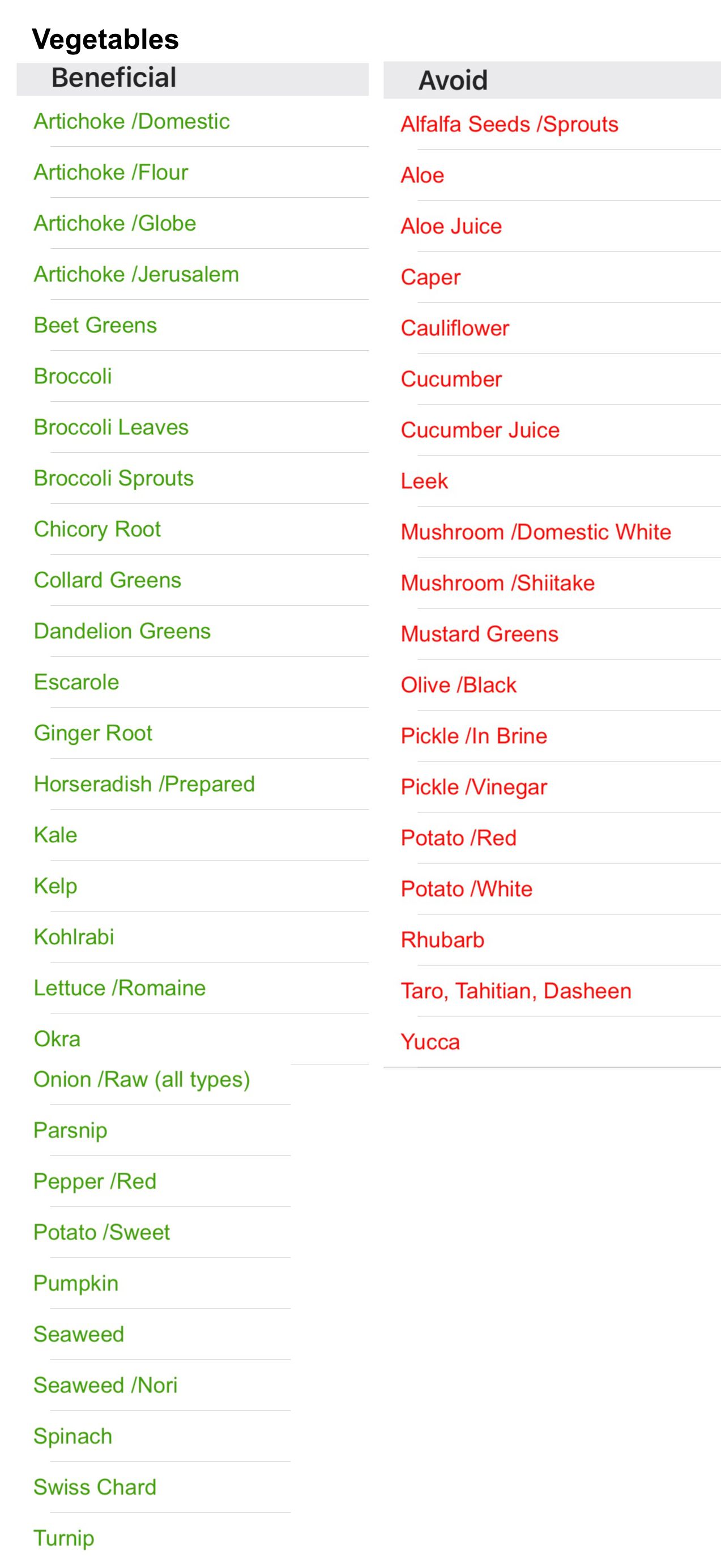
I did another gathering of food that were good for my body. One of my favorite nuts: macadamia was on the list. I didn’t have problems switching pistachios for macadamias. One problem solved! :). That went on for protein sources, fiber sources, etc. Until I had a good list of items to always buy.
What helped me is to write down the foods on the AVOID list in red, the SOMETIMES list in yellow. The rest, I can buy and eat freely! The AVOID list contained the items that I was intolerant to. The SOMETIMES list contains foods not highly beneficial for me, but not intolerant to.
Eat whole foods.
When I started doing my own grocery, it was like freedom from the shadow of my mom’s usual grocery list. I had to buy all the junk I couldn’t even buy. Buy canned goods whenever I can because it saves time cooking! My cart would usually be full and so heavy with cans that I couldn’t even carry myself! And it was a bad joke. Sure, I was ready for a catastrophe, having the lot of canned items in my shelf to a point where it would almost break.. but I was also breaking my heart.. Literally!
Before I went vegetarian, I loved corned beef. I had lots of different corned beef recipes, and they all taste good! I also didn’t use a lot of spices, I just bought salt, fish sauce and soy sauce and those famous food seasonings. Crazy enough, this gave me hypertension.
I made a pact with myself to not buy packaged food when I did my grocery. When I wanted fries, I chopped my own, sprinkled spices and bake in microwave and my cravings would be satisfied. Which leads to the next item..
Check your nutrition.
Before I had my blood pressure figured out, I just ate vegetarian dishes that I either cooked or bought from restaurants/stores. I had my mind fixed on the idea that cutting off meat was my main solution. I was wrong. While I'm journeying towards becoming vegan (currently vegetarian, part-time vegan), I'm not imposing that you follow my diet. I recommend studying how your body reacts to food.
I took on some recipes that were low sodium and picked up very good uses of spices to amplify and flavor your meals. I learned that salt wasn't the only thing I can add to make my meals palatable and enjoyable! I have learned to break away from sodium! This effected immediately with less bloat because the body needn't store more water to function.
Next up, I learned the intricate balance requirements for potassium, calcium and magnesium, and again: sodium.
Your body needs twice as much potassium as sodium to keep an important, energy-generating system in your cells functioning properly. It's called sodium-potassium pump. If you’re low on potassium, this pump produces products that can induce arteries to tighten up. 5 , 6 Excess dietary sodium also boosts blood pressure by trapping extra water in your blood. Your kidneys normally dump extra sodium into your urine for excretion, but potassium goes with it; if levels of this mineral are low, your body holds on to excess sodium in order to keep more potassium on board. And while potassium helps arteries stay flexible by activating the release of a relaxing compound called nitric oxide in artery walls, sodium has the opposite effect: It blocks nitric oxide and makes artery walls stiff.
Calcium helps blood vessels contract and expand; it also aids the transmission of signals in nerves and cells. These tasks are so important that if blood levels of calcium are low, your body will rob calcium from your bones to make sure they happen. When calcium intake is low, artery walls can tighten.
It helps potassium and calcium pass through cell walls to do their work. 21 This mineral also helps nitric oxide relax artery walls. 22 In 2013, Dutch researchers published two studies showing that low magnesium levels boost risk for heart attacks by 60 percent 23 and that high levels seem to lower risk for high blood pressure.
– excerpts from Lower your blood pressure naturally by Sarí Harrar and Dr. Suzanne Steinbaum
Not mentioned in the book was about protein intake.` There were protein sources there, but since I'm vegetarian, I have to find my own protein source. Since I'm intolerant to peas, I opted for pumpkin seeds powder. Did you know that 1/3 cup of pumpkin seeds is good enough to cover your daily protein requirement (for a female of my build, height and race)?!
While you can definitely take less of protein, remember that muscles make up a big part of our body, and even the heart is a big muscle in the middle of it all. Also, protein intake will help you burn more fat to remove your big belly!
At the end of my list of important nutrients is B complex. Being vegetarian, I have a lot of vegetables for sources. However, if I miss a good grocery day, I would most definitely need to take supplements because B deficiency could hamper your ability to do your workouts by having a general feeling of malaise. Which brings us to..
Exercise.
I know you knew this was coming! This is the part everyone hates! Who would like to swim in sweat on a hot day? Or catch your breath everytime you workout? Of course, none! But get this.. It gets better with time! You just need a plan!
Commit to workout plan for a minimum of 3 months. This way, you can be sure to get a well-rounded workout targeting different parts of the body. My recommendation is to start with a pre-training first. This will slowly get you used to working out more often than you do. In my case, I did Bodyboss workouts. I'm currently on my 8th week. I was really very consistent with the plan since pre-training up until the 4th week of the whole main workouts because I got injured in my wrist and knees. So, always be attentive to your alignment when exercising. Maintain good form over the required number of reps. That's important so you won't get injuries.
If you want to know exactly what I do, I did HIIT 3x a week, minimum 15 minutes of yoga everyday and jump rope every other day. HIIT is great if done in a fasted state too.
I do intermittent fasting so my exercise is usually in the earliest hours of the morning. This way, my body burns the fats I stored yesterday. Bonus is that HIIT continues burning fats up to an hour or so after you workout.
Jump rope is my main cardio. I used to run, but knee injuries prevent me from enjoying running long distances now. I opted for a low impact cardio burn of jumping ropes instead. I always go for minimum of 15 minute workouts.
Also, don't be lazy. Always try to move as often as possible. Stairs if it's just one or two floors up/down. Walk to wherever you need to go if it's feasible. This is still low intensity cardio. I usually walk 2-11 kms a week twice a week if schedule permits. All you'll need is your favorite supportive shoes and good headset for music.
Sleep & Water.
I was previously not a fan of water, as I'm a developer, caffeine is a staple fix, so water intake was very low for me. I started to count water intake using fixed sized glass, until I found Bellabeat's water bottle. That's what I use now. I even setup alarms for when I haven't drank in quite some time.
Believe it or not, while big gulps of water make you feel bloated, that's only temporary. When you're dehydrated, your body will anticipate that you're going through drought and retain more water. This is more popularly known as water weight. Avoid dehydration. This will complicate your nourishment requirements.
While I may be over disciplined in terms of food intake, sometimes I slack on sleeping. I love to sleep, but usually it's during skewed hours. If I don't get quality sleep in about 3 consecutive days, my waistline is a tad bigger than normal.
Bad sleep is equivalent to stress. The body releases cortisol which usually ends up in the belly area. Also, if we don't have good sleeping habits, the body releases more leptin.
Leptin is a hormone, made by fat cells, that decreases your appetite. Ghrelin is a hormone that increases appetite, and also plays a role in body weight.
-- https://www.webmd.com/diet/features/your-hunger-hormones
Aim for 6-8 hours of good sleep everyday. If at all possible, catch the sun in the morning so that you also don't suffer vitamin D deficiency.
Meditate.
I'm not asking everyone to get it the first time, or to sit without moving for an hour. The goal is to reduce stress! Reduce the brain clutter.
Let me ask you.. What's something that you do, that when you do it, you lose track of time? (With the specific exception of TV and gadgets--I know you'd say that!) This can be sweeping, washing dishes, reading a good book, gardening, playing with pets, etc. These activities lower brain activity and put your nervous system on relax. If you start with this, you will slowly appreciate time and being in the moment. This is what meditation actually means!
Find time. I read a book Attention Revolution, and recommended meditation for 24 minutes minimum. Why? It kinda represents 1 minute of every hour of the day! Isn't that awesome? Now take a hint from that.. If you don't have (read: feel like you don't have) a contiguous block of 24 minutes, meditate for a minute at the top of every hour, then you have finally done meditation. Easy peasy!
Intermittent fasting.
Now, a lot still say this is a fad, and studies are still very young to be really conclusive, however, there's no stopping you from seeing if it works for you.
The catch is, the body was designed to have a period of starvation. Imagine cro-magnons waking up to find food before they can even eat! That involves crafting their spears, running, crouching, sneaking to find prey. To me, that sounds a lot like my HIIT session in the morning before I hit my blender by noon! Or hurrying to cook my 12nn meal because I'm so hungry I could eat a horse! Just kidding!
The body needs about 8 hours minimum to continue digesting food that was last put in the body. Technically, that would be during sleeping, but sleeping also puts the body is slow state so you don't really get much digestion done when you sleep, plus sleeping with a full stomach would hurt your pancreas!
I don't do it strictly, but I adjust as the day demands. Say I go out and eat in the evening up to 9pm, I'll move my next day's first meal to 1pm.
Intermittent fasting: Eat between 12pm-8pm only
At the beginning, it's difficult. I suggest try drinking juice when you wake up. Soon, you'll adjust and you won't feel that hungry anymore.
Personally, IF helps me especially when I eat rice. By studying how my body behaves when eating different foods, I learned that I digest rice longer than any Asian. One cup of rice will automatically bloat me and it only goes away after 2 days!
Some people though might not benefit from IF. Be careful if you're diabetic or have thyroid issues. This could whack your hormones further.
So these are my guides for good health that helped me to slim down. I'm not perfect though, with some days of bad sleep comes some bad eating. Sometimes too much eating out also affects me negatively, so I just pick myself up and start again when I've fallen out of my routine. I hope you'll make good use of these information and good luck on your journey!
Send me a message/comment if you have questions!

